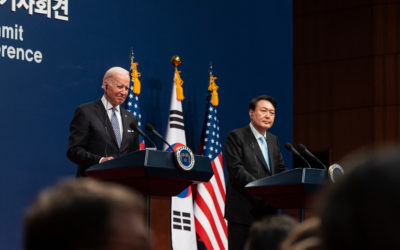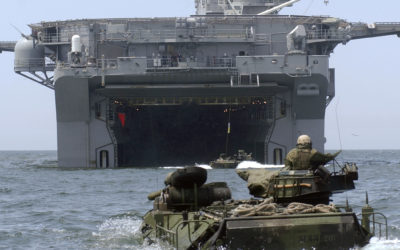On April 26, U.S. President Joe Biden welcomed South Korean President Yoon Suk-yeol to the White House for a summit meeting to celebrate the seventieth anniversary of the U.S.-South Korea alliance and open a new chapter for the next seventy years of expanded cooperation. Amid a substantial list of topics discussed by the two leaders, extended deterrence emerged as the top deliverable.
Russia and the Indo-Pacific Concept
Russia and the Indo-Pacific Concept
Russia and the Indo-Pacific Concept
The Indo-Pacific Challenge to Russia
The rise of a US-led coalition of states organised around the Indo-Pacific regional concept, with security cooperation embodied in the Quad security dialogue, constitutes a challenge to Russia’s efforts to carve a new international position for itself in Asia. These developments threaten four of Russia’s keys goals: to build diverse regional partnerships beyond China, notably with Quad members India and Japan; to promote multipolarity in Asia with Russia as an important independent actor; to link Russian-led Eurasian integration processes to Asia and Asian regional organisations, including through multilateral institutions where Russia has strong influence; and to diversify into Asia to balance the deterioration of ties with the US and Europe. As a result, Russia has increasingly looked to challenge and push back against the Indo-Pacific concept.36
In 2019, Putin sought to dismiss the Indo-Pacific concept, arguing that Russia does not support the creation of new power blocs – as occurred in the Euro-Atlantic area after the Second World War.37 Russia has advanced these views through active regional diplomacy, notably through regional formats like the SCO.38
The most frequent and comprehensive criticism of the Indo-Pacific concept has been voiced by Foreign Minister Sergei Lavrov. Speaking at the Raisina Dialogue in January 2020, Lavrov argued that the world is becoming multipolar and that Russia has been supporting the emergence of international institutions that reflect this new balance of power—the SCO, BRICS, RIC and the G20.39 These arrangements, Lavrov argued, are built on the core principles of the UN—the sovereign equality of states, non-interference in internal matters, respect for territorial integrity, and the peaceful resolution of disputes.40
In contrast, the Indo-Pacific concept, Lavrov argues, is designed to exclude China, not to unify the region. Implicit in Lavrov’s statement is the idea that the Indo-Pacific agenda is not just about limiting China, but rather is part of a wider US shift towards containing the world’s two pre-eminent land powers of Russia and China.41
The Russian government, thus, views the Indo-Pacific concept as an effort at the ‘reconfiguring of the existing structures’ and a move away from ASEAN-centred consensus-seeking forms of interaction, to the formation of divisive power blocs, which displace the shared Eurasian continent.42 Indeed, Russia places considerable emphasis on the regional centrality of ASEAN, reflecting its efforts to anchor its regional ties in the organisation, even though its influence in Southeast Asia is relatively modest.43
Speaking in July 2019, Lavrov indicated that Moscow is opposed to dividing Southeast Asia into blocs, as Russia argues is envisaged in the Indo-Pacific Strategy and especially with the creation of the Quad.44 Then Prime Minister Dmitry Medvedev noted in November 2019 that the ‘Indo-Pacific strategies undermine the core role played by ASEAN’.45 In 2021, Lavrov re-emphasised the need to retain ASEAN’s regional centrality in the face of the challenge of the Indo-Pacific idea.46
The Quad format may consolidate a new regional security order with the US at its core and India and Japan as members. The Quad excludes both Russia and China and bypasses the existing regional architecture (ASEAN) through which Moscow has sought to strengthen its regional role. In response to the first Quad summit in March 2021, Russia increased the tempo of its regional diplomacy, with Lavrov visiting China, South Korea, India and Pakistan in close succession.47 Speaking in New Delhi in April 2021, Lavrov indicated that Russia opposed the emergence of an ‘Asian NATO’, alluding to the development of the Quad as a military alliance.48
Russia has sought to frame the Indo-Pacific idea as an artificially imposed concept.49 Lavrov argues that it is not a natural integration project like the existing regional ones and is geographically ill-defined and divisive. Lavrov noted in 2020 that the US’s Indo-Pacific strategy is destructive as it is geared to divide the countries of the region into ‘interest groups’ and the Indian Ocean should not be ‘a cockpit of rivalry’.50
Russia’s strong criticism of the Indo-Pacific concept, and in particular the Quad security format, reflects Moscow’s concerns that its ambition to pivot to Asia will be weakened and, potentially, undermined by the coalescence of a new Indo-Pacific regional order around the US and its allies. Statements by Russian officials suggest that the Indo-Pacific concept could shift Asia’s
economic and security future towards the maritime and littoral areas of the Pacific and Indian Oceans, rather than into the heartlands of Eurasia, where Moscow has a central role. This strategy would lead to the reorientation of the key regional middle powers, notably India and the ASEAN countries, towards the US and risk confining Russia to a marginal regional role.51
Republished from the Royal United Services Institute under a Creative Commons license. Read the original article.

Neil Melvin is Director of International Security Studies at RUSI.
Related Articles
President Marcos Jr. Meets With President Biden—But the U.S. Position in Southeast Asia is Increasingly Shaky
Over a four-day visit to Washington, Philippine President Ferdinand Marcos Jr. has been welcomed to the White House and generally feted across Washington. With President Biden, Marcos Jr. (whose father was forced out of office in part through U.S. pressure, and whose family has little love for the United States) affirmed that the two countries are facing new challenges, and Biden said that “I couldn’t think of a better partner to have than [Marcos Jr.].”
The U.S. is about to blow up a fake warship in the South China Sea—but naval rivalry with Beijing is very real and growing
As part of a joint military exercise with the Philippines, the U.S. Navy is slated to sink a mock warship on April 26, 2023, in the South China Sea.
The live-fire drill is not a response to increased tensions with China over Taiwan, both the U.S. and the Philippines have stressed. But, either way, Beijing isn’t happy – responding by holding its own staged military event involving actual warships and fighter jets deployed around Taiwan, a self-governed island that Beijing claims as its own.



